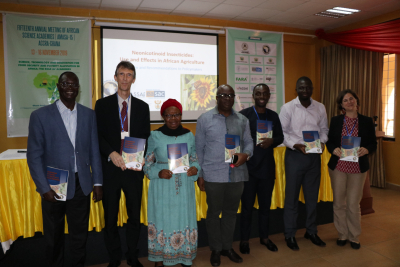


The study ‘Neonicotinoid Insecticides: Use and Effects in African Agriculture. A Review and Recommendations to Policymakers’ was launched on 12 November 2019 in Accra, Ghana, during the Annual Meeting of African Science Academies (AMASA-15). The InterAcademy Partnership (IAP) and the Network of African Science Academies (NASAC) collaborated in this study to examine the implications of neonicotinoid insecticide use for ecosystem services and sustainable agriculture in Africa.
This analysis has now been icluded in the online library of BES-Net, a network that facilitates and promotes dialogue on themes echoing the IPBES global assessments, and in key areas of UNDP’s work on biodiversity and ecosystems management. Through BES-Net, UNDP contributes to the capacity building work of the Intergovernmental Platform for Biodiversity and Ecosystem Services (IPBES).
As EASAC's Dr. Nina Hobbhahn explained in a guest blog post, AMASA-15 brought together over 100 representatives of Africa’s science academies as well as representatives from governments, universities, research institutes, farmers associations, agricultural board, and development partners, among others. One of the key discussion topics for the event was how to ensure food security for Africa’s growing population in the face of climate change, structural changes in land use and management, and intensification of agriculture, including the use of pesticides.
"Maintaining the biodiversity that supports ecosystem services such as pollination and natural pest control is critical to the sustainability of African agriculture, to ensure food security and its contribution to African economies and to support rural communities" writes Dr. Hobbhahn.
During a panel discussion, Prof. Peter Kofi Kwapong from the University of Cape Cost, Ghana, shared the highlights of the BES-Net’s Anglophone Africa Regional Trialogue, which was held in May 2018, in Nairobi, Kenya. He presented the key messages of the Intergovernmental Science-Policy Platform on Biodiversity and Ecosystem Services (IPBES) thematic assessments on pollinators and land degradation, and - as reported by Dr. Hobbhahn - emphasized the importance of promoting pollinator-friendly farming and sustainable land management policies and practices, as highlighted in the Trialogue Action Document.